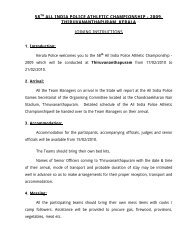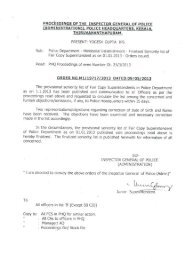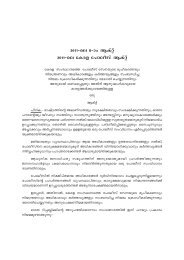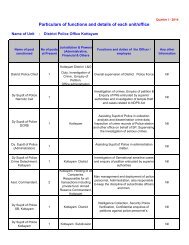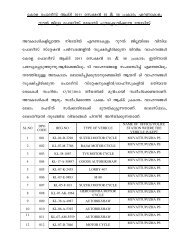Janamaithri Suraksha Project - Kerala Police
Janamaithri Suraksha Project - Kerala Police
Janamaithri Suraksha Project - Kerala Police
You also want an ePaper? Increase the reach of your titles
YUMPU automatically turns print PDFs into web optimized ePapers that Google loves.
Agency problems: ‘Implementation is beset with agency problem.’ The agent (field functionaries)<br />
may not always act according to the interest and instructions of the principal (the police department<br />
or the government). The routine the field functionary adopts may vary from the SOPs laid down by<br />
the organisational and the programme guidelines. For the beneficiaries of the scheme, the public,<br />
the community police officer is the symbol of government and the variance of the operating routine<br />
from the policy guidelines means that the outcomes may not correspond to those intended. The<br />
variance may not be intended but could be due to the operating constraints. The supervisory police<br />
officers are required to take feedback, allow the flexibility and make a course correction. Guidance,<br />
mentoring, aid and support to the field functionaries addressed the agency problem in <strong>Kerala</strong>. Exercising<br />
good old superintendence and control, periodically reviewing and issuing clarifications are meant to<br />
ensure that the ‘intent’ and ‘design’ of the policy conforms to the implementation. The government of<br />
<strong>Kerala</strong> appointed a senior police officer as State Level Nodal Officer who continues as such since<br />
the pre-implementation phase with a mandate to review, control and monitor the scheme.<br />
1.6.2 External challenges<br />
Political will and acceptance: A shorthand definition of political will is: the commitment of actors to<br />
undertake actions to achieve a set of objective and to sustain the costs of those actions over time. A<br />
policy-problem is chosen for decision making when a problem is recognised, a solution is available,<br />
the political climate make it ripe for change, and the constraints do not prohibit action. The ‘window of<br />
opportunity’ (policy window) is open when three separate streams of problems, solutions and politics<br />
come together, a pre-requisite for policy acceptance. When the political will is lacking, the political<br />
stream does not align with the other two streams, the fate of the policy hangs in uncertainty. In case<br />
of <strong>Kerala</strong>, ‘<strong>Police</strong> Performance and Accountability Commission’ was appointed by Sri A. K. Antony as<br />
Chief Minister of the <strong>Kerala</strong> (UDF) in the year 2003. When the Commission submitted its<br />
recommendations in March 2005, Sri Oommen Chandy (UDF) was the incumbent Chief Minister<br />
following the resignation of Sri Antony in the previous year. 2005-06 was the election year for the 12<br />
thAssembly. The decision of the government whether to introduce community policing might have<br />
been weighed against other pressing electoral agendas lying before it though both the Chief Ministers<br />
belonged to UDF. Here, two factors, firstly, the change of incumbent Chief Minister and secondly, the<br />
pre-election political commitments, set the tone of the political stream against any policy innovation.<br />
The role of policy entrepreneurs becomes crucial to push through and navigate the policy processes<br />
through the policy window. Two successive police chiefs of the state played this role with dexterity till<br />
the <strong>Janamaithri</strong> was launched in 2008 as a full-fledged public policy during the LDF rule.<br />
Trust deficit: The essence of Community policing is to minimise the gap between policemen and<br />
citizens to such an extent that the policemen become an integral part of the community they<br />
serve. In other words, the individual policeman should know each member of the community and<br />
he should, in turn, be known by them. That is to say there is no anonymity between them and is<br />
replaced with harmony and trust.’ The community has to reciprocate the new good will gesture<br />
initiated from the side of the police. But the suspicion and lack of trust prevented the public to<br />
accept the initiatives of the police at the policy making stage of <strong>Janamaithri</strong>. Such was the level of<br />
distrust that the public perceived it to be guile to ‘allow the youth wing of the ruling party to take over<br />
certain police function.’ A community police officer told, ‘during initial phases of house visits some<br />
residents offered me money thinking that this was the purpose of my visit. I had a tough time to<br />
explain them the objectives of <strong>Janamaithri</strong>.’ The police leadership had to work overtime to plan<br />
new strategies to reach out the public, engaged all the stake-holders and launched a well coordinated<br />
campaign to make their intentions clear.<br />
Resource scarcity: The police organisation functions at an optimal level within finite resources to<br />
perform infinite tasks. There is a significant gap between the department’s aspiration and availability<br />
of resources. Any new mandate poses additional burden on the scarce resources, may it be<br />
logistics, manpower, transport or budget. <strong>Janamaithri</strong> is a manpower intensive initiative as in case<br />
of any other community policing scheme. Each <strong>Janamaithri</strong> <strong>Police</strong> Station needed additional eight<br />
to ten police personnel to act as community police officers in the designated beats within police<br />
station. However, the decision of launching the scheme only in twenty police stations as pilots<br />
helped overcoming the huge requirement of manpower. The state police chief, who himself was<br />
spearheading the initiative, had two options. Firstly, to ask the government to increase the manpower<br />
before the implementation and secondly, to manage the initial phase by mobilising resources from<br />
within the organisation and ‘selling’ the spread-effect to the political leadership which in turn would<br />
17






